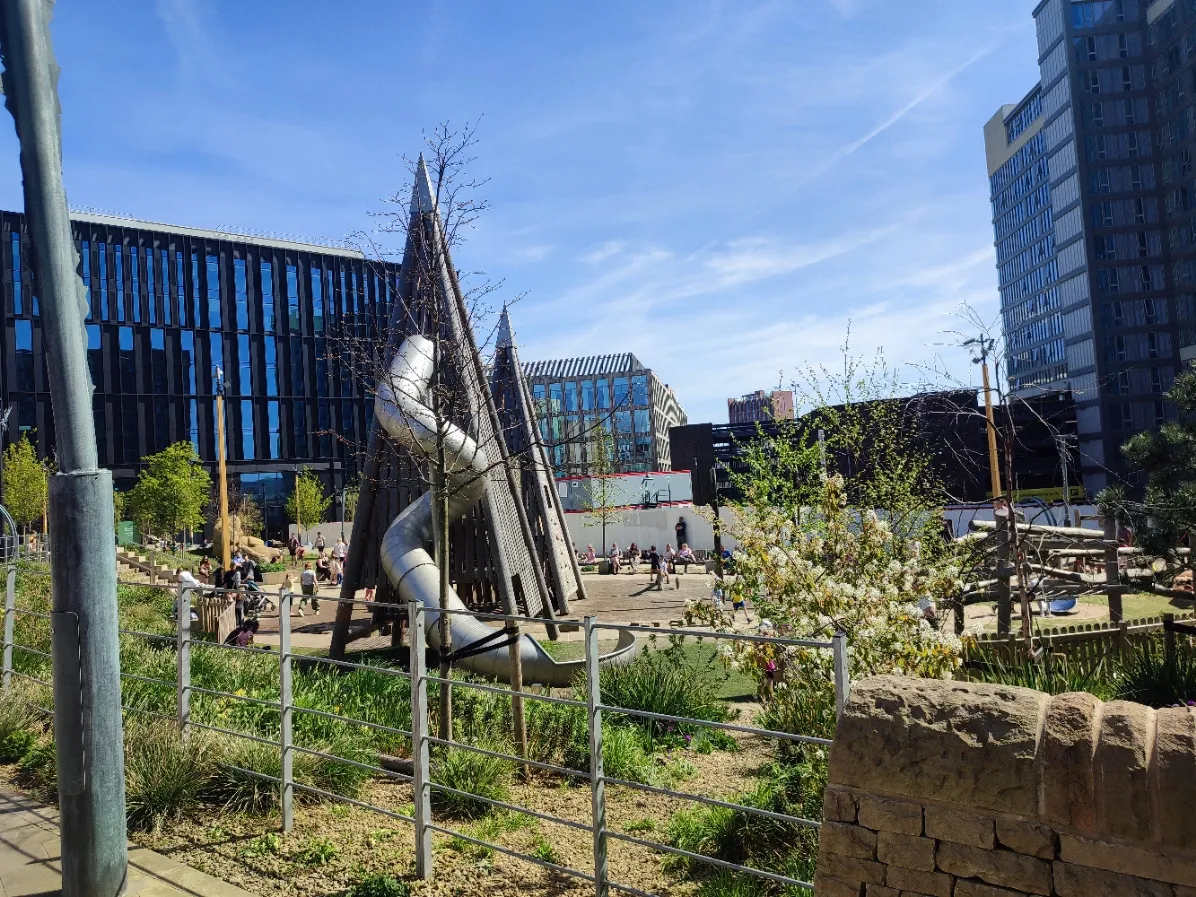“When we put it on at the National Theatre, nobody — least of all me — knew if anyone would come,” says Rupert Lord, the commercial producer who shepherded the musical Standing at the Sky’s Edge into life. “By the time we got to the first performance, the sales were modest, and everyone was going…” He makes an awkward, hedging-your-bets sort of hmm sound. “By the time we’d done five previews, the whole run was sold out. It’s a word-of-mouth show.”
Since opening at The Crucible in 2019, Standing at the Sky’s Edge has become a slow-burn, home-grown, quintessentially Sheffield success story. With a script by Chris Bush, who grew up here, and music by Richard Hawley — who likely needs no introduction — it tells the story of the Park Hill estate, via three families who lived in the same flat over sixty years: a steel family hit hard by Thatcherism, a family of Liberian refugees, and a middle class transplant from the south. It moves from the optimism of the 1960s through the decline and deprivation of the 1980s, before landing in 2015 on a wave of new regeneration and gentrification.

The show has also been on its own journey. Such were the glowing reviews of the first production, it was re-mounted at The Crucible in 2022, before transferring to the largest stage at the National Theatre in London in 2023, winning an Olivier award for Best New Musical along the way. Now, Sky’s Edge is heading for the bright lights of the West End, where it opened at the Gillian Lynne theatre on 8 February.
It is a fairly rare good news story for a brand-new British musical. Developing a musical is a notoriously tricky (and expensive) endeavour, and for every inventive fresh show like Six the Musical or Everybody’s Talking About Jamie (another Sheffield triumph), there are many more that play it safe by sticking to known quantities. West End theatres and touring schedules are packed with nostalgia-led adaptations (Pretty Woman, Back to the Future), bankable versions of family-friendly books and films (Frozen, Charlie & the Chocolate Factory), jukebox musicals about globally famous icons (Tina, MJ the Musical), or proven old classics (The King & I, Kiss Me Kate). A new musical about a Brutalist housing estate and socio-economic decline, with songs by a well-respected but not exactly universally-known artist and zero big-name stars? That was never going to be considered a safe bet.

Still, it would be a misconception to suggest that musicals need to be blandly feel-good to succeed, says Sam Marlowe, an editor for The Stage. “Sondheim obviously didn’t flinch from tough subjects and psychological complexity,” she says, and points out that Evita and Jesus Christ Superstar are “juggernauts of commercial musical theatre”. Marlowe adds that newer works like Hamilton and Les Miserables also “deal with meaty political and historical narratives”, but recognises that the storming success of Sky’s Edge is unusual nonetheless. “New musicals are very difficult — and expensive — to get right,” she says.
So what is it about this musical that has succeeded where many others have failed? And how has this seemingly hyper-local show captured the hearts of London theatre-goers as easily as it won over Sheffielders?

Writing a successful new musical needs “luck, and the magic touch”, says Sarah Hemming, theatre critic for the Financial Times. She gave Sky’s Edge five stars in a review when it opened in London, and will be watching with interest to see how a West End audience responds to it. She says the play’s journey to the West End has been a story of its own: “It’s had its own different generations, different iterations.” Hemming — as with everyone I speak to, frankly — believes that the key to its success is that, at its core, Sky’s Edge is telling a universal story about home, belonging, and community.
“It’s really good at describing a universal issue through the specific,” Hemming says. By focusing very much on Sheffield, and one particular housing estate, it tells the story of the UK: “That journey from 1960s optimism through the 80s into post-industrial decline, and then re-gentrification. It speaks to anyone who’s been around the last few decades and is living in the current world.”

It was Rupert Lord who first approached Hawley about getting involved. To convince him, he knew that Sky’s Edge would, first and foremost, have to get this story right for the people of Sheffield. “Richard feels very strongly about how he represents his community, so all of his questions boiled down to: ‘Why should I trust you to do this… you soft southerner?’” Lord laughs. “I think he is happy now that he can walk in the streets and people will say, ‘I saw that show and it’s the story of my mum, or my dad’. It’s true to the stories of Sheffield.”
Lord echoes Hemming’s comments. “To unlock the universality of the story, you’ve got to get the specifics right,” he says, pointing to the fact that the script makes reference to Henderson’s Relish, something he had no acquaintance with prior to working on the show but now loves. In a similar vein, when the show was going down to London, people told him that no one would get references to Henderson’s or the Owls/Blades, and that he would have to change it. “But as soon as you water it down, it makes people just go: ‘That lacks authenticity.’” This instinct has proven correct, he says — during the run at the National, he’s had people from Paris, Tokyo, and Toronto tell him they felt the show could have been about their city. “Find me a city that doesn’t have social housing,” says Lord. “This is a show about home. It is a show with heart and authenticity. People respond to that.”

Ruby Clarke, who was born and raised in Sheffield, works on the development of new plays at Sheffield Theatres (she wasn’t involved in Sky’s Edge beyond reading some early drafts). As both theatre-maker and Sheffield resident, she pinpoints the specifically northern voice of the characters as key to its success. “The spirit and humour is bang-on. The sense of humour, the dark dry tones, the sarcasm, the stoic way difficulties are handled… People watch the play and recognise their dad, their auntie, themselves,” Clarke says. “I know that the stories are based on research about the building and the stories that came from ex-residents. It is a very realistic fictional history, based in truth.”
Sky’s Edge transferring to the National Theatre made a lot of sense to her, but she never imagined going into the West End. Though Clarke expresses mild concerns that London audiences might think this tale represents the whole city, rather than Park Hill more specifically, she again reaches for that ‘u’ word: “It shows the universal human experience, within the specifics of its parameters.”

Sky’s Edge has been a critical hit, winning five-stars reviews in each iteration, but it’s the word-of-mouth recommendations that have really been crucial to making it a box office success, Lord believes. Anecdotally, that feels true; anyone I meet in Sheffield who finds out I write about theatre for a living wants to talk to me about the show, and for a while last year I was getting several messages a week from London friends desperate to talk about the Sheffield musical, and how much it made them cry.
For Clarke, much of this buzz is down to Bush’s script. Sky’s Edge is just beautifully constructed: the stories of three different sets of residents overlap and interact within the physical space of a Park Hill flat, and the more you get to know them, the more each enriches the other, or provides a potent, poignant counterpoint. “Dramaturgically it’s magic, because it allows us to hold all of the stories through the generations in our heads simultaneously,” says Clarke. “We can still feel the joy of a newlywed couple moving into the new building [in 1960] as we watch a Londoner attempt to cook an Ottolenghi recipe in the newly refurbished kitchen [in 2015].”

Hemming also brings up the satisfying structure, and celebrates Bush’s work in general for its theatrical ambition (another project in Sheffield, Rock Paper Scissors, staged three plays simultaneously across three stages — a mind-mangling technical feat). Hemming points out that any of the narratives in Sky’s Edge could have made for a standalone story, but adds that “by interweaving them, you get a kind of 3D effect. You get greater perspective and nuance; you see repetitions and the consequences of decisions.”
Of course, its success goes beyond the narrative and characters. Hemming praises Sheffield Theatres’ head Robert Hastie for pulling off the incredibly difficult task of wrangling three timelines simultaneously across Ben Stones’ impressive, multi-level, Brutalist set. It’s also Hawley’s music that effectively amplifies, underscores, and gives new meaning to the feelings swirling down the decades and around the concrete walkways. Not that his work would necessarily seem like the obvious choice for a musical — you’d be hard pressed to find someone more different to Lord Andrew Lloyd Webber.

Yet in today’s climate, there is absolutely an audience for musicals that are sonically far from the common conception of what showtunes should sound like. In recent years, we’ve had Girl From the North Country, which plundered Bob Dylan’s back catalogue; Hadestown, based on Anais Mitchell’s concept folk album; and Lazarus, which used the songs of David Bowie. The way Sky’s Edge used Hawley’s songs was enjoyably sideways, compared to what they might expect of a musical. “It’s a different way of using music, isn’t it? Sometimes it’s quite sharp and tart, sometimes it’s much more dreamy, moody,” says Hemming. Besides, she adds, Hawley’s music is still “soul-stirring stuff”. “It worked magnificently in the Olivier. I think it will in the Gillian Lynne as well. It fills the space. It soars.”
So, will all of this be enough to make Sky’s Edge succeed in the West End? Only time — and ticket sales — will tell. Even Lord can’t be totally sure. “I don’t know if it is commercially viable!” he says. “It could be more about me being deranged than anything else.” But he says they never set out to do something that would be commercially viable: “We set out to make a great story.” And if the things that make the story so great — the heart, the humour, the characters united by the very human urge to call a place home, and yes, the universality of it — can resonate on its largest stage so far, then surely the sky’s the limit.


Comments
How to comment:
If you are already a member,
click here to sign in
and leave a comment.
If you aren't a member,
sign up here
to be able to leave a comment.
To add your photo, click here to create a profile on Gravatar.








